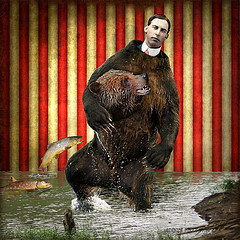You have no items in your cart. Want to get some nice things?
Go shopping
It wasn’t the sounds of bells and grunts that drew the boy into the tent, so much as the stunned silence that filled the gaps between them – that peculiar sound of many people being very quiet all at once. And that, he decided, meant something worth watching. He shouldered his way through the sweating audience until he found a spot at the front. The rest of the crowd were dark shapes in the lamplight, statues, transfixed by the spectacle in the middle of the ring.
A dense, bulky man prodded the bear, goading it upright, waltzing it in clumsy circles. He jabbed it with a cane and clapped out an irregular beat with thick gloved hands. At his command, the bear rose on tiptoes, swaying and ducking and turning in lurching shapes. The handler dwarfed his charge. He was a huge man, and the bear was a scraggy, pathetic animal, emaciated, the skin hanging loosely from its shoulders. It reeled from step to step, exhausted and almost falling, staggering between paces and pirouettes.
The boy frowned, leaned forward, peering in the gaslight. Something didn’t seem quite right. He took a tentative step into the ring, coming close enough to see.
‘Hey,’ he muttered, ‘that’s not a bear.’
The audience around him rippled with gasps of disbelief. Somebody moaned. Slowly, the bear stopped dancing, and the handler lowered his cane, glaring. The boy grew bolder.
‘That’s just a man in a bear suit!’
The handler was on him in a heartbeat. Huge hands pinned the boy by the arms and effortlessly lifted him to eye level. The handler’s face was barely visible, tucked into an outsize bowler hat and lost behind coarse whiskers. Deep within the shadows of the hat, the boy saw himself reflected in shiny beetle eyes. The handler leaned in close, and closer still, until his breath blew on the boy’s cheek, hot and wet and reeking of meat. When he spoke, his voice was raw.
‘Why don’t you look again?’ he growled, and the boy felt something primal coiling in his belly.
He looked again.
The bear stood entirely still in the centre of the ring, just watching. It was gaunt, and its pelt hung off it like a shadow, bunched loose around the legs, hanging deadweight from the hips and shoulders. It looked so forlorn. The boy half-imagined something like pleading in its eyes.
The handler growled again, low and urgent from the abyss of his throat. A burr of icy prickles writhed inside the boy.
‘N-no,’ he stammered. ‘Maybe not. It’s just a bear. I guess I was wrong.’
The handler grinned, showing all his teeth. It was an awful sight.
‘Good lad,’ he said. He lowered the boy to the ground and turned back to his charge. At once, the bear jigged and limped into action, hopping from one leg to the other.
The boy found himself shaking. A nervous hand fell on his shoulders. He looked up into the face of the lady beside him. She was trembling too.
‘Don’t worry about it,’ she whispered. ‘I was wrong as well.’
A large damp patch had flooded down her skirts and curdled on the sawdust floor.
‘Isn’t it amazing,’ she whispered, her voice strained with fear, ‘how much they look like people?’
All around, the audience agreed with nods and fervent murmurs. And in the ring, the handler jabbed with his cane, again and again, and the bear danced ever onwards.

About Simon Sylvester
Simon Sylvester is a writer, teacher and occasional filmmaker. His first novel, The Visitors, was published by Quercus in 2014, going on to win the Book Box prize and the Guardian Not The Booker prize. The Visitors has been a Book of the Month for Waterstones Scotland and part of W.H. Smith's Fresh Talent 2015. Simon's short stories have been published by dozens of magazines and journals, and he has written more than a thousand flash stories on Twitter. He lives in Cumbria with the painter Monica Metsers and their daughter Isadora.




